The Intel Core i9-9900KS Review: The 5 GHz Consumer Special
by Dr. Ian Cutress on October 31, 2019 10:45 AM ESTCPU Performance: Encoding Tests
With the rise of streaming, vlogs, and video content as a whole, encoding and transcoding tests are becoming ever more important. Not only are more home users and gamers needing to convert video files into something more manageable, for streaming or archival purposes, but the servers that manage the output also manage around data and log files with compression and decompression. Our encoding tasks are focused around these important scenarios, with input from the community for the best implementation of real-world testing.
All of our benchmark results can also be found in our benchmark engine, Bench.
Handbrake 1.1.0: Streaming and Archival Video Transcoding
A popular open source tool, Handbrake is the anything-to-anything video conversion software that a number of people use as a reference point. The danger is always on version numbers and optimization, for example the latest versions of the software can take advantage of AVX-512 and OpenCL to accelerate certain types of transcoding and algorithms. The version we use here is a pure CPU play, with common transcoding variations.
We have split Handbrake up into several tests, using a Logitech C920 1080p60 native webcam recording (essentially a streamer recording), and convert them into two types of streaming formats and one for archival. The output settings used are:
- 720p60 at 6000 kbps constant bit rate, fast setting, high profile
- 1080p60 at 3500 kbps constant bit rate, faster setting, main profile
- 1080p60 HEVC at 3500 kbps variable bit rate, fast setting, main profile
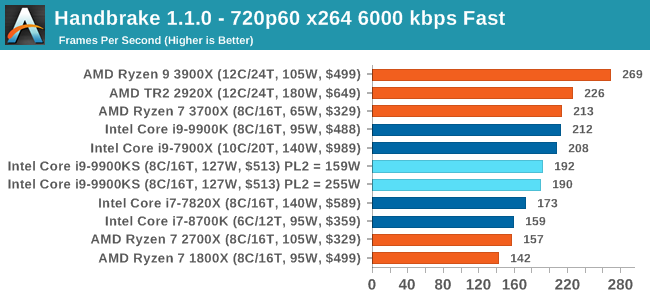
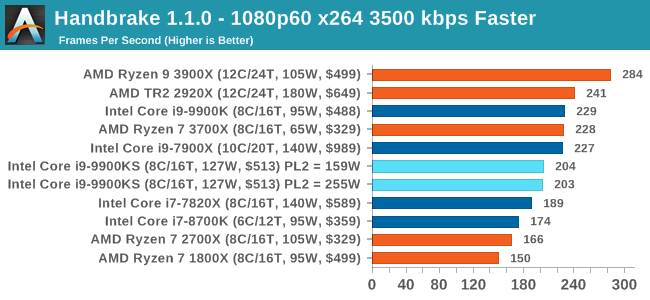
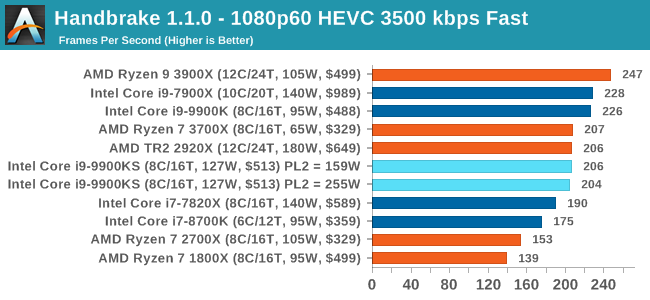
The 9900KS performed worse than our 9900K in our Handbrake tests, and we're not entirely sure why. It might be related to the regression we saw with DigiCortex.
7-zip v1805: Popular Open-Source Encoding Engine
Out of our compression/decompression tool tests, 7-zip is the most requested and comes with a built-in benchmark. For our test suite, we’ve pulled the latest version of the software and we run the benchmark from the command line, reporting the compression, decompression, and a combined score.
It is noted in this benchmark that the latest multi-die processors have very bi-modal performance between compression and decompression, performing well in one and badly in the other. There are also discussions around how the Windows Scheduler is implementing every thread. As we get more results, it will be interesting to see how this plays out.
Please note, if you plan to share out the Compression graph, please include the Decompression one. Otherwise you’re only presenting half a picture.
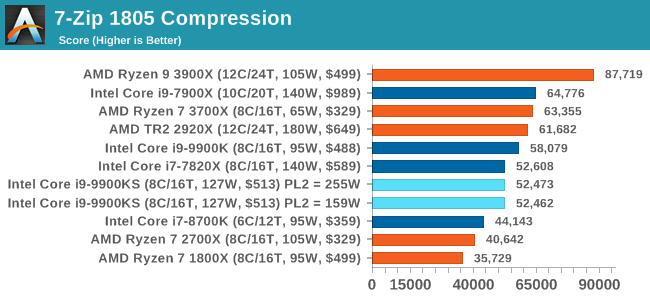
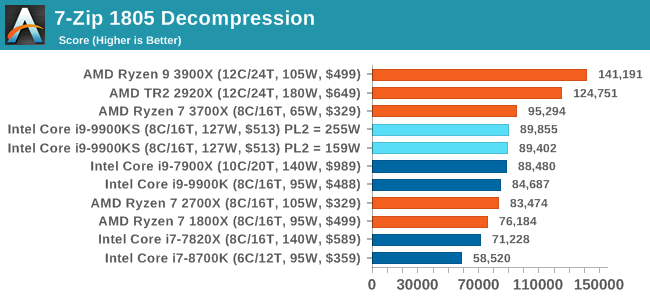
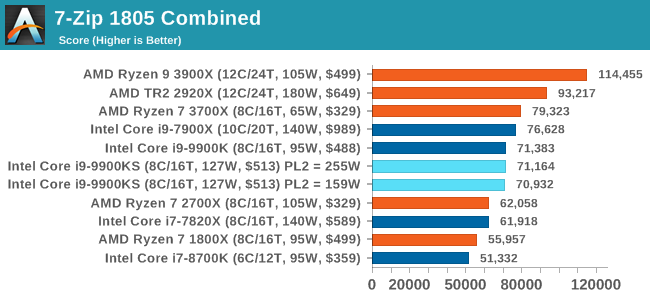
Both the 9900KS settings perform identically here, however the Compression test shows a performance regression compared to the standard 9900K. It does make me wonder if there are additional differences between the two chips (such as an internal clock).
WinRAR 5.60b3: Archiving Tool
My compression tool of choice is often WinRAR, having been one of the first tools a number of my generation used over two decades ago. The interface has not changed much, although the integration with Windows right click commands is always a plus. It has no in-built test, so we run a compression over a set directory containing over thirty 60-second video files and 2000 small web-based files at a normal compression rate.
WinRAR is variable threaded but also susceptible to caching, so in our test we run it 10 times and take the average of the last five, leaving the test purely for raw CPU compute performance.
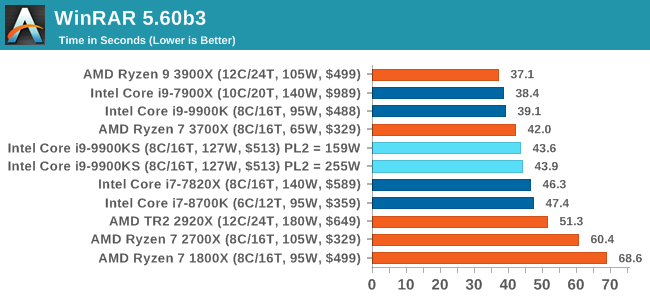
AES Encryption: File Security
A number of platforms, particularly mobile devices, are now offering encryption by default with file systems in order to protect the contents. Windows based devices have these options as well, often applied by BitLocker or third-party software. In our AES encryption test, we used the discontinued TrueCrypt for its built-in benchmark, which tests several encryption algorithms directly in memory.
The data we take for this test is the combined AES encrypt/decrypt performance, measured in gigabytes per second. The software does use AES commands for processors that offer hardware selection, however not AVX-512.
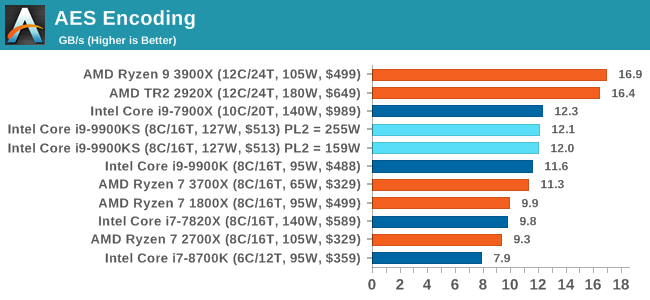










235 Comments
View All Comments
amnesia0287 - Saturday, November 16, 2019 - link
Can’t tell if playing stupid or srs.The IPC advantage is 10%, the clock speed advantage is >10%.
Intel chips all the cores are able to boost to the same levels. AMD chips now have varying spec cores and only the best 1-2 hit the advertised speeds and only when there are only a few threads running. If you are doing heavy multitasking, most of the AMD cores will be dramatically slower than those of the 9900ks.
That said the AMD chips still have a number of other advantages such as more pci bandwidth and no tiny DMI bottleneck. Lower cost, lower power use and generally more cores.
Right now it really comes down to what you plan to use it for. There is little doubt AMD is in a better spot right now, but it remains to be seen if they can hold it past 2021 as intel transitions to 7nm and MCM.
Korguz - Saturday, November 16, 2019 - link
" The IPC advantage is 10%, the clock speed advantage is >10%." and WHY do you think intel has the lead, even barely, in some cases. because of the clock speed advantage. Intel's cpus NEED this advantage just to keep the performance they have. think about it, a LOWER clocked chip over all is performing about the same,( depending on usage ) and in some cases better, then the higher clocked equivalents clock these chips the same, and i bet the story would be quite different. " Intel chips all the cores are able to boost to the same levels " at quite a bit more power usage too." 2021 as intel transitions to 7nm and MCM. " more like IF intel can transition to 7nm by then, look how long it has taken them to get to 10nm..
shaolin95 - Monday, November 11, 2019 - link
*cough, cough* butthurt AMD fanboy detected *cough, cough*Qasar - Monday, November 11, 2019 - link
how so ??? seems there are more intel fans but hurt lately...peevee - Friday, November 1, 2019 - link
:)Funny, I had exactly the same thought.
But honestly, for many real world uses (games etc) 4 cores at even faster frequency would be even better. Physically separated on the die as far as possible (in the corners) by huge amount of shared L3.
I guess 5GHz base/6GHz turbo is not out of the question within the same TDP with liquid cooling.
eva02langley - Thursday, October 31, 2019 - link
A joke of a CPU. How can this cost more than a 3900x?eva02langley - Thursday, October 31, 2019 - link
Not to mention that with the price gouging, you are almost near the MSRP of the 3950x.prophet001 - Thursday, October 31, 2019 - link
People want this for clock speed.12 slow cores aren't helpful if you need a few fast ones.
eva02langley - Thursday, October 31, 2019 - link
AHAHAHA... okay, we have a blind fanboy here. Do you know anything about IPC? This CPU get destroyed in EVERYTHING except old games running outdated engines at 1080p. SO unless you buy this with a 2080 TI and a 240Hz 1080p monitor, you are not going to benefit from it.Basically, with a budget, the 9900KS is a waste of money, period. The money you save buying a 3700x and investing in your GPU will give you some serious gaming performances increase.
xenol - Thursday, October 31, 2019 - link
Honestly anything more than a midrange CPU and GPU is a waste of money for most people.